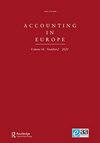Did the International Financial Reporting Standards Increase the Audit Expectation Gap? An Exploratory Study
IF 4.3
Q1 BUSINESS, FINANCE
引用次数: 6
Abstract
Abstract I examine the role of IFRS on the Audit Expectation Gap (AEG). Past research, mostly based on Porter [(1993). An empirical study of the audit expectation-performance gap. Accounting and Business Research, 24(93), 49–68. https://doi.org/10.1080/00014788.1993.9729463]’s work, does not identify the contribution of accounting standards to the AEG. Yet, IFRS may play a crucial role in an auditor’s mission, because accounting standards now result in more complex and more subjective rules and financial statements. I examine whether IFRS are a factor explaining the perception of the AEG and its components by auditors and preparers of financial information. And, if so, what does this impact, more specifically, result from? Using survey data of 158 auditors and preparers of financial information working in an IFRS environment, I find that the contribution of IFRS to the AEG is underestimated while it is, in fact, at least as important as auditing standards. In addition, respondents think that IFRS generated more complexity (especially regarding issues raised by IFRS 9, IAS 36/IFRS 3 or IFRS 2) and more subjectivity, which contributed to the AEG, and led users of financial statements to be more demanding towards auditors. Auditors are perceived as supposed to be able to offset difficulties suffered by investors regarding the complexity and subjectivity of IFRS. However, the capacity of auditors themselves to fully understand the complexities resulting from IFRS may be overestimated. Furthermore, the results show that auditors’ skills and training seem to be insufficient regarding the increasing complexity of IFRS. Lastly, I find that less experienced respondents underestimate the contribution of accounting standards to the AEG.《国际财务报告准则》是否增加了审计期望差距?探索性研究
摘要我研究了国际财务报告准则在审计期望差距(AEG)中的作用。过去的研究,主要基于Porter[(1993)。审计期望绩效差距的实证研究。会计与商业研究,24(93),49-68。https://doi.org/10.1080/00014788.1993.9729463]的工作,没有确定会计准则对AEG的贡献。然而,《国际财务报告准则》可能在审计师的使命中发挥着至关重要的作用,因为会计准则现在导致了更复杂、更主观的规则和财务报表。我研究了《国际财务报告准则》是否是解释审计师和财务信息编制者对AEG及其组成部分的看法的一个因素。如果是这样的话,更具体地说,这种影响是由什么引起的?通过对158名在IFRS环境中工作的审计师和财务信息编制者的调查数据,我发现IFRS对AEG的贡献被低估了,而事实上,它至少与审计标准一样重要。此外,受访者认为,《国际财务报告准则》产生了更大的复杂性(尤其是关于《国际财务报表准则第9号》、《国际财务会计准则第36号》/《国际财务财务报告准则第3号》或《国际财务报告准则第2号》提出的问题)和更多的主观性,这有助于AEG,并导致财务报表用户对审计师的要求更高。审计师被认为能够抵消投资者在《国际财务报告准则》的复杂性和主观性方面遇到的困难。然而,审计师自己充分理解《国际财务报告准则》所产生的复杂性的能力可能被高估了。此外,研究结果表明,鉴于《国际财务报告准则》日益复杂,审计师的技能和培训似乎不足。最后,我发现经验不足的受访者低估了会计准则对AEG的贡献。
本文章由计算机程序翻译,如有差异,请以英文原文为准。
求助全文
约1分钟内获得全文
求助全文

 求助内容:
求助内容: 应助结果提醒方式:
应助结果提醒方式:


